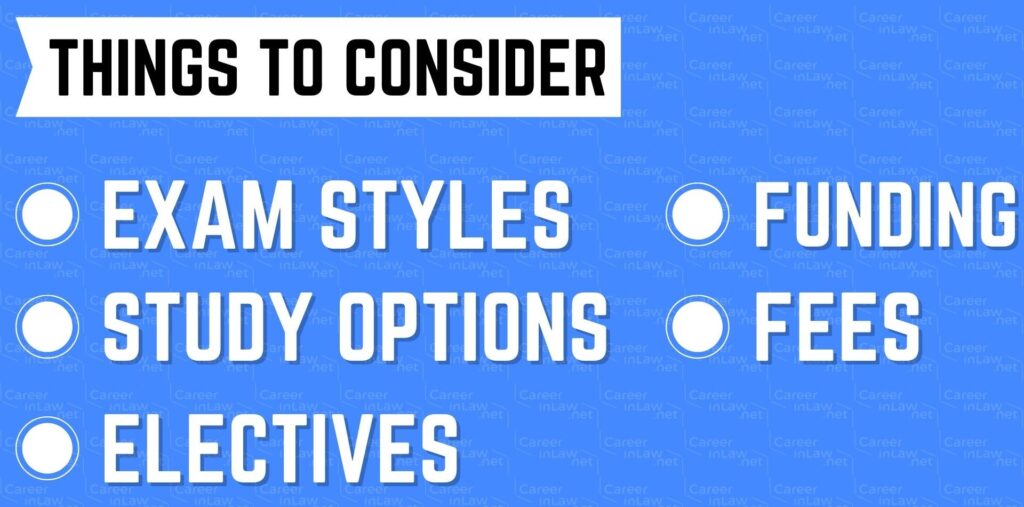Many students struggle to decide where to study, at the BPP or University of Law. Both are arguable the two biggest legal postgraduate education providers. Current or former law students and non-law degree graduates should explore both providers as possible options for their further studies.
If you are planning on pursuing the LPC, law conversion course (PGDL), or the SQE prep, the chances are that you will be comparing these two quite a lot. This guide will compare studying at ULaw and BPP University with regards to examination, study options, electives (options), accelerated courses, costs, funding, and study flexibility.
The Comparison
Below you will find our detailed comparison. It is important to note that postgraduate courses at both universities satisfy Law Society requirements to becoming a solicitor in England & Wales.

Examination Styles
The way each university approaches exams is surprisingly different and can be different from what you were used to at your LLB law school studies.
BPP University Law allows certain permitted materials that students can bring to their exams. Students can typically bring statute books that are given to them for each module and some handbooks on areas of law such as Butterworths Company Law Handbook. It is worth noting that no annotations can be made in your permitted materials.
On the other hand, exams at the University of Law are mostly open book. You can bring anything you want to the exams. They are 80% open book for each of the core modules, and the remaining 20% are closed book but multiple-choice questions. As for electives, the exams are all open book.

The Costs: BPP or University of Law
Postgraduate law courses can be expensive. The costs differ depending on the provider and the location.
Legal Practice Course – LPC
- The BPP LPC costs range from £12,290 to £16,690.
- The University of Law LPC costs range from £12,750 to £17,300.
Law Conversion Course – GDL/PGDL
- The BPP Law Foundation Course costs range from £9,824 to £14,914.
- The University of Law PGDL costs range from £10,100 to £12,550.
Solicitors Qualifying Examination Prep – SQE
- The BPP SQE costs range from £7,250 to £8,750.
- The University of Law SQE costs range from £4,000 to £5,000 and offers a wider selection of SQE prep courses.
Available Electives
The choice of electives at both universities is quite similar and would allow you to “tailor” your education to increase your chances of securing a training contract. However, the BPP’s electives are geared more towards commercial and corporate practice with modules like corporate finance and international trade and transactions.
ULaw provides more of a traditional range of electives with modules like commercial law and mergers and acquisitions.
Flexibility of Study

Both universities offer online module delivery; however, the University of Law allows for greater flexibility for in-person modules.
The University of Law allows you to pick how many days you would like to come in for in-person modules. You can usually choose between 2 or 4 days, and this is determined on a first come first serve basis.
BPP law school does not have the same option.
Accelerated and Part-Time Options
The BPP and the University of Law both provide accelerated and part-time options for some of their courses alongside their traditional full-time courses. Thus, whichever option you choose will greatly affect how many days a week you will have to commit to your studies.
Funding Options
The University of Law and BPP both offer LLM programs that can be incorporated with other courses, and doing so can qualify you for postgraduate funding of up to £11,222.
As for scholarships, BPP University law school offers £1 million in scholarships, with one £2,000 scholarship and two £1,000 scholarships.
ULaw offers £2 million in scholarships, with several scholarships ranging from £1,000 to £5,000.
Both universities offer a limited number of full-tuition scholarships.
Your Choice: BPP or University of Law
At first glance, it may seem as though ULaw and BPP may have the same programs, but there are some key differences. It is important that you consider all aspects of each program and pick one that is most suitable for you. Don’t just focus on the position of BPP University ranking or on the ULaw ranking, explore a lot more than that! Each educational institution has a lot to offer. It is crucial to find which one suits you best.
You should take into consideration the amount of face-to-face teaching, careers services, and exposure to law firms and their recruitment events. After conducting detailed research you will be able to answer is BPP better than the University of Law or vice versa. You should also allow yourself ample time to develop your commercial awareness. If you cannot secure formal law work experience, you should look for volunteering or pro bono opportunities.

